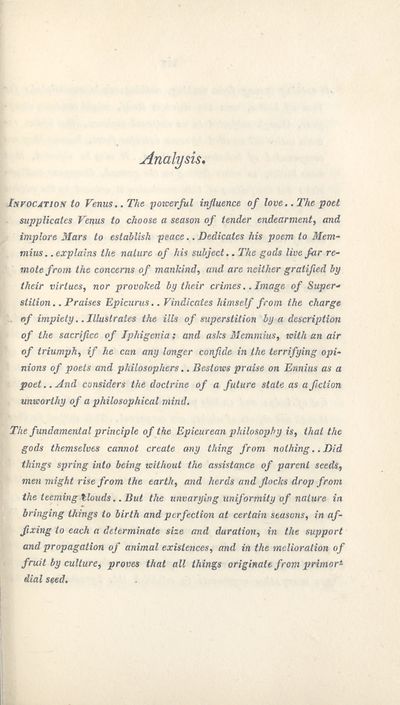Download files
Complete book:
Individual page:
Thumbnail gallery: Grid view | List view

Analysis.
Invocation to Venus. .The powerful influence of love.. The poet
■ supplicates Venus to choose a season of tender endearment, and
implore Mars to establish peace.. Dedicates his poem to Mem-
mius.. explains the nature of his subject.. The gods live far re¬
mote from the concerns of mankind, and are neither gratified by
their virtues, nor provoked by their crimes.. Image of Super¬
stition.. Praises Epicurus.. Vindicates himself from the charge
of impiety.. Illustrates the ills of superstition by a description
of the sacrifice of Iphigenia; and asks Memmius, with an air
of triumph, if he can any longer confide in the terrifying opi¬
nions of poets and philosophers.. Bestows praise on Ennius as a
poet.. And considers the doctrine of a future state as a fiction
unworthy of a philosophical mind.
The fundamental principle of the Epicurean philosophy is, that the
gods themselves cannot create any thing from nothing.. Did
things spring into being without the assistance of parent seeds,
men might rise from the earth, and herds and flocks drop from
the teeming llouds.. But the unvarying uniformity of nature in
bringing things to birth and perfection at certain seasons, in af¬
fixing to each a determinate size and duration, in the support
and propagation of animal existences, and in the melioration of
fruit by culture, proves that all things originate from primor¬
dial seed.
Invocation to Venus. .The powerful influence of love.. The poet
■ supplicates Venus to choose a season of tender endearment, and
implore Mars to establish peace.. Dedicates his poem to Mem-
mius.. explains the nature of his subject.. The gods live far re¬
mote from the concerns of mankind, and are neither gratified by
their virtues, nor provoked by their crimes.. Image of Super¬
stition.. Praises Epicurus.. Vindicates himself from the charge
of impiety.. Illustrates the ills of superstition by a description
of the sacrifice of Iphigenia; and asks Memmius, with an air
of triumph, if he can any longer confide in the terrifying opi¬
nions of poets and philosophers.. Bestows praise on Ennius as a
poet.. And considers the doctrine of a future state as a fiction
unworthy of a philosophical mind.
The fundamental principle of the Epicurean philosophy is, that the
gods themselves cannot create any thing from nothing.. Did
things spring into being without the assistance of parent seeds,
men might rise from the earth, and herds and flocks drop from
the teeming llouds.. But the unvarying uniformity of nature in
bringing things to birth and perfection at certain seasons, in af¬
fixing to each a determinate size and duration, in the support
and propagation of animal existences, and in the melioration of
fruit by culture, proves that all things originate from primor¬
dial seed.
Set display mode to:
![]() Universal Viewer |
Universal Viewer | ![]() Mirador |
Large image | Transcription
Mirador |
Large image | Transcription
| Antiquarian books of Scotland > Poetry > First book of T. Lucretius Carus of the nature of things > (21) |
|---|
| Permanent URL | https://digital.nls.uk/117747786 |
|---|
| Description | Thousands of printed books from the Antiquarian Books of Scotland collection which dates from 1641 to the 1980s. The collection consists of 14,800 books which were published in Scotland or have a Scottish connection, e.g. through the author, printer or owner. Subjects covered include sport, education, diseases, adventure, occupations, Jacobites, politics and religion. Among the 29 languages represented are English, Gaelic, Italian, French, Russian and Swedish. |
|---|

